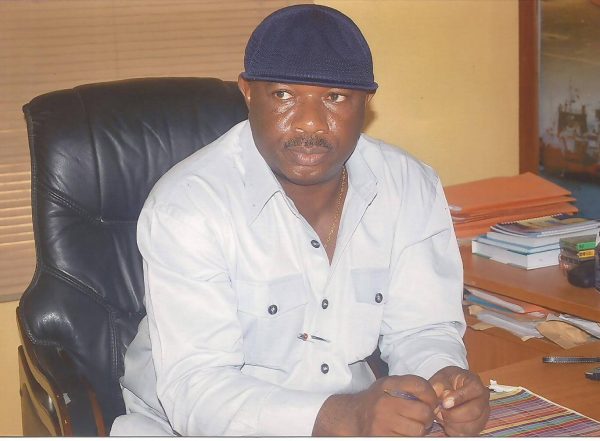
By Kenneth Jukpor & Ayoola Olaitan
Dr. Boniface Aniebonam is the Founder of the National Association of Government Approved Freight Forwarders (NAGAFF). In this exclusive interview with MMS Plus newspaper, he bares his mind on a myriad of freight forwarding issues in the country as well as other pertinent port sector developments.
Enjoy it:

The establishment of NAGAFF Compliance Team has elicited many commendations as well as criticisms. What is this team set to achieve?
Well, there is a lot of misunderstanding about the reasons behind the establishment of the NAGAFF Compliance team. The message of the Compliance team is to add value via engagement with crucial stakeholders. A lot of people, freight forwarders and the terminals may not know what they are doing, hence the numerous challenges and there is a need for education.
The Compliance team is a very simple and strategic team that understands what the rules on exports and imports procedures are. This ensures all players in the logistics chain follow the rules and not go contrary. If you go contrary you will be breaching the law. For instance, on the matter of untrue declarations of consignment which is an act of breaching the law and this attracts penalty and seizure of such consignment.

The challenges affecting freight forwarders in Nigeria are not only disturbing NAGAFF, would the Compliance team be able to set the path for other freight forwarding associations to follow?

The world is a global village. Right now, with the help of our media partners all activities of the Compliance team can be read across various news platforms and this means that we are passing the message already to others in other associations. We are showing them the path to follow in the quest to have seamless port operations. So, the message is for all. This is a medium of education on matters that has to do with rules of engagement in clearing and making genuine declarations
What are some of the challenges and how does NAGAFF intend to tackle them, as most people are yet to key into the path of compliance?
It is understandable; naturally people will want to do the wrong thing and this is not good for the industry even to the economy at large. The point is that rules are meant to guide us on various activities and they must be obeyed. We just have to take responsibility for some of the things we are doing and that is why we are having the Compliance team at the ports.
Looking at the challenges at the ports, does it make sense where one cannot access the port for hours because some people are not doing the right thing? The gateway to the nation’s economy has been in such a state of crisis for years. The ports cannot be accessed easily and long hours/ days are spent on queues on port access roads, yet time is money. Shipping is an international business and the high demand in Nigeria as a result of the huge population should place the nation as a hub for international trade in the West and Central African region, but that isn’t the reality.
How does the Compliance team handle information and cargo tracking at the ports? Looking at the fact that everyone at Nigerian ports is trying to hide something because the environment creates income for them especially shipping companies and terminals operators; would this pose a challenge to the activities of the Compliance team?
Well, as freight forwarders we handle documents. It must be understood that Customs operations at the ports are mostly e-transactions which include tracking containers. It is so easy now that a container could be standing and the number on it gives information about the container using the right system to access information such as; where it is coming from, the country and shipper.
So, when we suspect something, there are measures in place to verify, especially when it bothers on security issues. If a container is not examined there are security implications. If Customs containers are taken out of the control of the Service, the first thing is security which is a serious issue.
At the sea ports the compliance team will be dealing with terminal operators and bonded terminals, how will they be able to carry out their duties without misunderstanding with the purpose?
The Compliance team is a persuasive team and they were elected to do the right thing in other to allow for smooth ports operations and not an enforcement role.
Looking at the current situation with the seaport terminals concession, an economic regulator must check the fiscal records of terminals but this arrangement came before the Nigerian Shipper’s Council (NSC) was designated the economic regulator at the ports. Today, the concession agreement has been amended and NSC wasn’t included in the procedure. This shows the level of secrecy in the system, how then do you rate the activity of NAGAFF’s persuasive Compliance team?
We would not want to do everything in a day; we are taking things gradually so we can achieve our set goals. We are still faced with the issue of acceptability and this is what we are working on before moving further.
Like I said before now, we are practitioners; dealing with somebody who is an insider is different from dealing with an outsider. There is need for caution in our dealings and we have the authority to operate in the ports. We also have access to relevant information.
Just like what you’re asking me, it takes time for policies or ideas to be accepted, for example people still do not understand what Compliance is all about. They know, but they are just being mischievous because their businesses seem to be under threat.
We’re telling them it should not be a threat but to add value to what they’re doing, nothing says that you must be doing things to the contrary before you can succeed. We must educate agents that before a cargo can be cleared from Customs control there is a fee that should be paid and your professional fee, which has been approved by the Council for the Regulation of Freight Forwarding in Nigeria (CRFFN).
So, if I’m to move it to a 40ft container out of the port and my operational fee, for example is only N100,000, I know this is not my money If I succeed. I’ll make the importer pay all the required duties so that I can clear the goods without any problem. But if we’re still operating a port whereby I charge you N200,000 when the Customs duty is N1million and I intend to use the N200,000 to bring out the container, then there is a problem.
Last week, CRFFN revealed that POF collection has started, how has it been so far in terms of level of Compliance and how does this affect other aspects of port operations?
I read this development the same way you might have read it and I reacted by responding to the Chairman of CRFFN and the Registrar through a tweet. They replied me with a statement that they solicited for my support. The letter they sent to NAGAFF was forwarded back to them and they still gave the same response by asking for my support.
Are they serious minded people one may ask? In view of the fact that they seek my support, I will support them since that is what they want.
Nigeria is 60 years old and there have been several issues in the freight forwarding industry but as a stakeholder, what are the major areas that need serious attention?
There is little we could do without CRFFN working. The non performance of the organization is affecting the maritime industry. It is obvious that we are just marking years as an industry especially in the area of professionalism in freight forwarding practice.
Another thing is the issue of amendment of the CRFFN Act. This is still in the Court of Appeal as to whether CRFFN is supposed to be an agency of the government or not. That is still what is been filed at the court as there are moves to make it an agency of the government. For instance, the registrar of CRFFN is above 60 years of age. If he is seen as a government worker, then his age disqualifies him from being a civil servant. The whole situation at CRFFN is messed up, also, the vice chairman of the Governing Board is elected but the president is not elected.
 MMS PLUS NG – Maritime, Aviation, Business, Oil and Gas News Online Newspaper with coverage in Maritime, Oil and Gas, Aviation, Power and Energy as well as Financial News
MMS PLUS NG – Maritime, Aviation, Business, Oil and Gas News Online Newspaper with coverage in Maritime, Oil and Gas, Aviation, Power and Energy as well as Financial News









